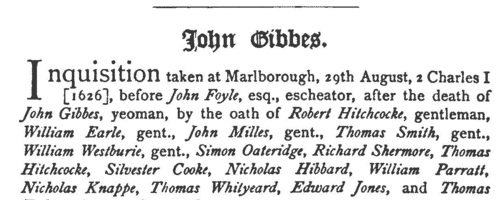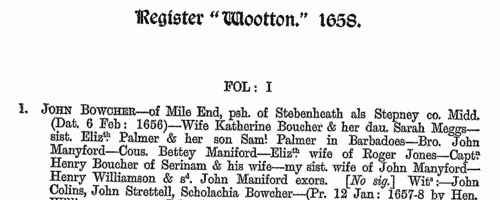Augar Surname Ancestry ResultsOur indexes 1000-1999 include entries for the spelling 'augar'. In the period you have requested, we have the following 5 records (displaying 1 to 5):
Buy all | |
| Get all 5 records to view, to save and print for £24.00 |
These sample scans are from the original record. You will get scans of the full pages or articles where the surname you searched for has been found.
Your web browser may prevent the sample windows from opening; in this case please change your browser settings to allow pop-up windows from this site.
Fine Rolls
(1246-1272)
The fine rolls of the 31st to 57th years of the reign of king Henry III record part of the government administration in England. These excerpts from the rolls list in transcript applications by plaintiffs for various writs (such as 'ad terminum' and 'pone') and for assizes to be held by the justices in eyre to look into their grievances. A fine of half a mark (6s 8d) or a mark (13s 4d) was usually levied; the cases are normally identified by county, and record that the appropriate sheriff had been notified. There are also more extensive records, in which more detail is given. The excerpts were made by the Record Commission and printed in 1836.AUGAR. Cost: £4.00.  | Sample scan, click to enlarge

|
Wiltshire freeholders
(1625-1645)
Inquisitions post mortem were held after the death of freeholders who held their estates in capite or in chief, i. e., directly from the crown. The inquisition, held by the royal escheator upon the oath of jurors from the county who were also normally freeholders, recorded what estates the deceased had held, by what tenure, what they were worth, the date of death, who was the next heir, and whether the heir was of age. The sample scan shows an unusually brief inquisition: these abstracts usually run to two or three pages of print. AUGAR. Cost: £4.00.  | Sample scan, click to enlarge

|
Prerogative Court of Canterbury Wills: Essex: Strays
(1658)
William Brigg compiled abstracts of all the wills in Register "Wootton" of the Prerogative Court of Canterbury. The abstracts of those proved in 1658 were published by him in 1894. The court's main jurisdiction was central and southern England and Wales, as well as over sailors &c dying abroad. We have re-indexed the whole volume, county by county, for both testators and strays (legatees, witnesses and other persons mentioned in the abstracts). AUGAR. Cost: £4.00.  | Sample scan, click to enlarge

|
Essex Freeholders: Dengie and Winstree hundreds
(1810)
The poll of the freeholders of Essex at the election of a knight of the shire to serve in Parliament, taken at Chelmsford 31 January 1810 and fourteen following days (Sundays excepted). The candidates were John Archer Houblon esquire and Montagu Burgoyne esquire. This poll book gives the names of the voters arranged by initial letter of surname division by division. The freeholders' full names are stated, surname first, residence (often elsewhere), and place where the freehold lay. The right hand column records their votes. The qualification for suffrage in the counties was the possession of a freehold estate worth more than 40s a year. The electoral divisions comprised these hundreds: I. Barstable and Chafford; II. Becontree and Waltham; III. Chelmsford; IV. Hinckford; V. Tendring; VI. Uttleford, Clavering and Dunmow; VII. Harlow, Ongar and Freshwell; VIII. Lexden, Colchester and Witham; IX. Rochford and Thurstable; X. Dengie and Winstree.
AUGAR. Cost: £6.00.  | Sample scan, click to enlarge

|
Poachers committed to prison at Saffron Walden in Essex
(1833-1836)
In response to a parliamentary enquiry, returns were made in early 1836 from each of the gaols in England and Wales of the number of commitments, prosecutions, convictions and sentences under the game laws since 1 November 1833. The returns varied in scope; most give the full name of each poacher, date, and sentence. The usual offence is that of 'poaching', i. e. being out armed in the night in pursuit of game; occasionally it was aggravated by assaulting a gamekeeper &c.AUGAR. Cost: £6.00.  | Sample scan, click to enlarge

|
Research your ancestry, family history, genealogy and one-name study by direct access to original records and archives indexed by surname.







